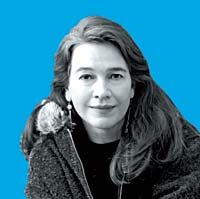 Louise Erdrich’s dad doled out a nickel for every story she wrote as a child, and there was plenty of fodder in Erdrich’s half-German, part-Ojibwe household in North Dakota. Drawing on this distinctive heritage, she made her auspicious début in 1984 with Love Medicine (it snagged the National Book Critics’ Circle Award) and since then has produced poetry, fiction, children’s books, nonfiction, and short stories. Erdrich’s ten novels, imbued with Native American life and characters, resonate universally, and with tremendous lyrical power. The latest addition, The Painted Drum, is no exception: troubled-even ruined-lives are woven together across time, linked by a sacred drum with a tragic origin. Victoria Lautman interviewed Louise Erdrich, who spoke from her home in Minneapolis, where she also operates the independent bookstore Birchbark Books and Native Arts.
Louise Erdrich’s dad doled out a nickel for every story she wrote as a child, and there was plenty of fodder in Erdrich’s half-German, part-Ojibwe household in North Dakota. Drawing on this distinctive heritage, she made her auspicious début in 1984 with Love Medicine (it snagged the National Book Critics’ Circle Award) and since then has produced poetry, fiction, children’s books, nonfiction, and short stories. Erdrich’s ten novels, imbued with Native American life and characters, resonate universally, and with tremendous lyrical power. The latest addition, The Painted Drum, is no exception: troubled-even ruined-lives are woven together across time, linked by a sacred drum with a tragic origin. Victoria Lautman interviewed Louise Erdrich, who spoke from her home in Minneapolis, where she also operates the independent bookstore Birchbark Books and Native Arts.
Q: “Boozhoo!” Doesn’t that mean “hello” in Ojibwe?
A: Yes, and that’s a great greeting that we use all the time. It comes from the name of the trickster/hero Nanaboozhoo, which I think is kind of cool.
Q: At the start of your career in 1982, Chicago gave you a leg up by awarding you the first Nelson Algren Award.
A: Oh, yes! I felt like I was plucked out of complete anonymity. I was flown out to Chicago and I remember eating in some incredible place and then being driven around in a limousine. It was . . . like a dream. And best of all I got to talk to Studs Terkel. It was all just amazing. I was 28 years old and so broke.
Q: Well, maybe you had a good time then, but the word is you avoid book tours and public lectures. You’re sort of elusive.
A: I didn’t realize I’d earned that reputation! But, especially in the beginning, I was so nervous before a tour I would just walk out into the woods and fall down. I became a writer so I could hide-writing is what an introvert does-but then I was forced out into the world. And the touring takes an enormous amount out of me. It’s easier now that I’ve had kids and I’ve learned to be more social, but it still takes a long time for me to re-establish my internal equilibrium after I get home.
Q: In The Painted Drum, children are put in harm’s way due to the flaws and mistakes of the adults around them. Were these just interesting story lines for you, or was it more personal?
A: I don’t think anything I ever do is just for an interesting story line. This book probably comes out of what for me is the biggest fear and nightmare of parenting: the inevitability of failing your children. No one can ever feel they’ve done everything right, and if they do, that’s another form of failure. In this book I was coming to terms with those issues.
Q: So, did a drum ever play a special role in your life?
A: The first really impressive sound I ever heard was that of a drum-it’s true for most kids with native backgrounds. I loved going to powwows and still do, and when I was a little kid I would dance. But then I got too shy.
Q: On another note, why does my review copy have a crossed-out poem at the end and pages ripped out?
A: Oh, I kept adding words and text right up till the last minute on this one, cutting and adding. I really drove my editor to the brink!


